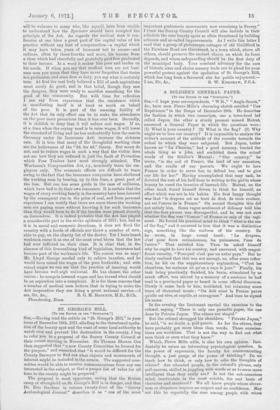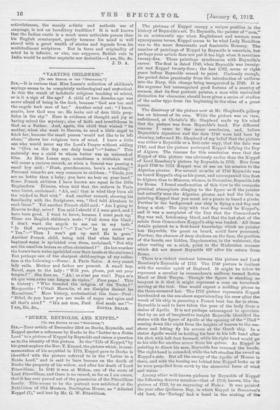A SOLDIER'S GENERAL PAPER.
[To THE EDITOR OF THE " SPECTLTOR.1 Sin,—I hope your correspondents, " W.R.," "Anglo-Saxon," &o., have seen Pierre Mile's charming sketch entitled " Une Experience" in the Temps of December 28th. He describes the fashion in which two conscripts, one a town-bred lad called Jupon, the other a sturdy peasant named Matrat, answered a General Paper in which the questions were (1) What is your country P (2) What is the flag P (3) Why ought we to love our country P It is impossible to analyse the writer's account of the attitude of the recruits towards the ordeal to which they were subjected. But Jupon, better known as " La Chemise," had a good memory, treated the whole thing as a joke, and scribbled down the actual words of the Soldier's Manual : " Our country," he wrote, "is the soil of France, the land of our ancestors, and the cradle of our parents. We ought to love France in order to serve her, to defend her, and to give our life for her." Having accomplished that easy task, he devoted the rest of his half-hour to writing to the girl to whose bounty he owed the luxuries of barrack4ife. Matrat, on the other hand, found himself driven to think for himself, an effort which was not in his habits. His first happy thought was that " le drapeau est un bout de drat, de trois couleur, qui est Poneur do la France." On second thoughts this did not satisfy him. Some vague sentiment of delicacy told him that the first phrase was disrespectful, and he was not sure whether the flag was "l'oneur " of France or only of the regi- ment. He forced his practical mind to think "what is the use of the flag," and it occurred to him that it was a distinctive sign, something like the uniform of the country. So he wrote, in large round hand: " Le drapeau, c'est pour force connaissance, les puissances, Tune de Pantre." That satisfied him. Then he asked himself why he ought to love his country, and answered, with magni- ficent veracity, "Pourquoi c'est pas un autre pays." But he dimly realized that this was not enough, so, after some reflec- tion, he hit on the supplementary explanation, " C'eat lea ohambres, les maisons oii qu'on a rep le jour." Finally, his task being practically finished, his brain, stimulated by so much effort, was stirred by a memory of a sentence ho had read in a provincial paper or heard in some official discourse. Slowly it came back to him, mutilated, but retaining some trace of rhetorical music : " On doit aline la France paroe qu'elle est vive, et suptile, of courageuse." And then he signed his name.
In the evening the lieutenant carried the exercises to the colonel, saying, " There is only one passable paper, the one done by Private Jupon. The others are stupid."
But the colonel shrugged his shoulders. " Private Jupon," he said, "is no doubt a poll-parrot. As for the others, they have probably got more ideas than words. These examina- tions are worthless. That is not the way to find out what men think or even what they know."
Which, Pierre Mille adds, is also his own opinion. Inci- dentally he raises an interesting psychological question. la the power of expression, the faculty for communicating thought, a just gauge of the power of thinking P Do we teach how to think, or only bow to echo the thoughts of others ? Are educated people, in the colonel's phrase, only poll-parrots, skilled in juggling with words so as to seem more intelligent than they really are P Is not the sub-conscious mind, inarticulate in the most voluble, the real basis of character and manhood ? We all know people whose clever- ness or eloquence inspires no respect and no confidence. May not this be especially the case among people with whom articulateness, the merely artistic and Misthetio use of language, is not an hereditary tradition P It is well known that the Indian rustic is a much more articulate person than his English counterpart, partly because his mind is well stored with a great wealth of stories and legends from his multitudinous scriptures. But in force and originality of mind be is inferior, or else, one supposes, British rule in India would be neither requisite nor desirable.—I am, Sir, &c.
J. D. A.



















































 Previous page
Previous page